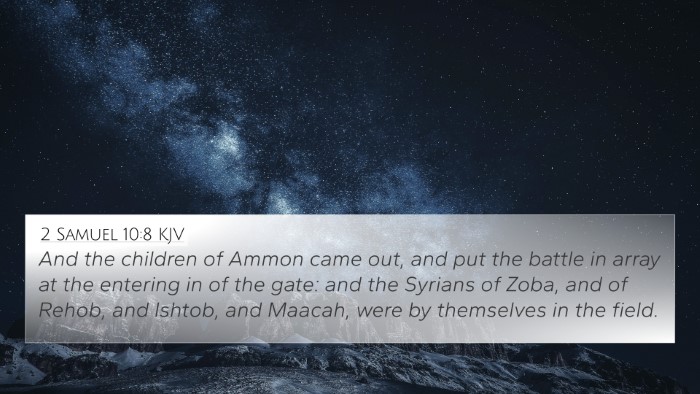Understanding Judges 11:3
Judges 11:3: "So Jephthah fled from his brothers and settled in the land of Tob. A group of adventurers began to gather around Jephthah and went out with him." This verse introduces us to Jephthah, a significant character in Israel's history, focusing on themes of leadership, exile, and rebellion.
Contextual Overview
The narrative of Judges captures a turbulent period in Israel's history, marked by disobedience and the need for deliverance through appointed leaders known as judges. Jephthah, whose origins are particularly unique because he is the son of a harlot, faces rejection from his family, prompting him to seek refuge in Tob. This rejection serves as a catalyst for his future leadership.
Commentary Insights
The following insights are drawn from noted public domain commentaries:
- Matthew Henry: Highlights the theme of God's providential preparation of Jephthah. His rejection by his family and subsequent association with a group of adventurers foreshadows his future role as a leader of Israel. Jephthah’s story symbolizes how God can raise a leader from humble beginnings against the backdrop of family strife.
- Albert Barnes: Points out the strategic significance of Jephthah settling in Tob, which was likely a region that offered him a mix of safety and opportunity. Barnes elaborates on the qualities of Jephthah, portraying him as a complex figure who, amidst his social rejection, garners a following, indicating his strong leadership qualities.
- Adam Clarke: Discusses the "men of valor" that gathered around Jephthah, interpreting this as a reflection of his inherent leadership abilities and charisma. Clarke emphasizes the idea that true leadership often arises during periods of trial and adversity, paralleling Jephthah's eventual rise to prominence.
Thematic Connections
Judges 11:3 encapsulates several significant themes:
- Rejection and Redemption: Jephthah’s journey illustrates how rejection can lead to divine purpose, providing a broader narrative arc where God utilizes the marginalized.
- Leadership From Adversity: The gathering of adventurers around Jephthah signifies that real leaders often emerge in times of adversity and chaos.
- Preparation for Deliverance: Jephthah’s exile and subsequent rise suggest that God prepares deliverers from unexpected circumstances and backgrounds.
Bible Verse Cross-References
This verse connects to various other scriptures that deepen our understanding of Jephthah’s narrative and biblical themes. Noteworthy cross-references include:
- 1 Samuel 16:7: God's choice is not based on human standards, paralleling Jephthah's chosen status despite his dubious lineage.
- Hebrews 11:32-34: Jephthah is listed among the heroes of faith, illustrating how God can work through imperfect vessels.
- Judges 5:7: Describes Deborah leading Israel, hinting at the necessity of diverse leadership during crises.
- Genesis 49:19: Prophecies of conflict that suggest the struggles faced by the Israelites align with Jephthah's battles.
- Luke 2:8-14: Highlights marginalized figures receiving divine attention, akin to Jephthah's initial rejection yet eventual elevation.
- Matthew 5:14-16: The call to be a light in the world resonates with Jephthah’s transformative journey from obscure exiled to a judge of Israel.
- Romans 8:28: The assurance that God works all things for good can be seen in Jephthah's rise from rejection and isolation to leadership.
Connecting the Verses
Understanding Judges 11:3 requires recognizing its links to broader biblical narratives and themes. This provides a foundation for:
- Cross-referencing Biblical texts: Evaluating how leadership dynamics and character backgrounds are treated throughout scripture.
- Bible verses that relate to each other: Noting the interconnections between Judges and the New Testament reflections on leadership and faith.
- Thematic Bible verse connections: Understanding how themes of rejection and eventual triumph are woven throughout God's design and plan.
Final Thoughts
Judges 11:3 serves not only to introduce Jephthah but also to encapsulate essential biblical truths about God's methods of calling leaders from unexpected backgrounds. For anyone studying this verse, it is crucial to explore the scriptural cross-references it invites, providing deeper insights into God's redemptive work throughout history.










